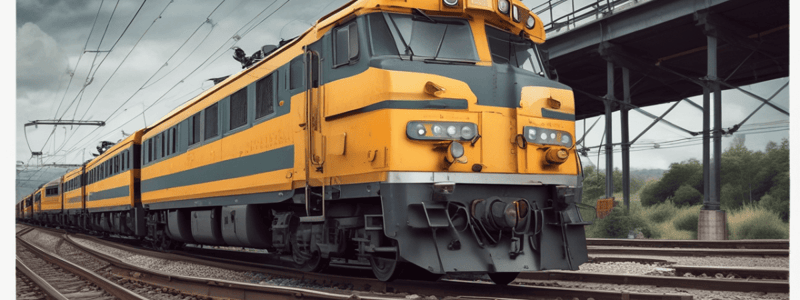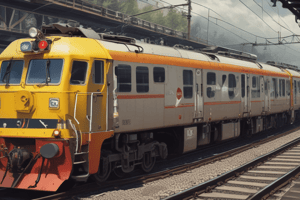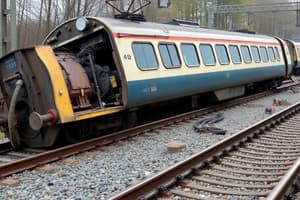Podcast
Questions and Answers
Who is responsible for developing an Incident Action Plan (IAP)?
Who is responsible for developing an Incident Action Plan (IAP)?
- The Incident Commander (IC) (correct)
- The TTC Incident Commander (IC)
- The Emergency Response Commander (ERC)
- All personnel on scene
What is the minimum number of Thermal Imaging Cameras required per crew when responding to a fire in a subway station?
What is the minimum number of Thermal Imaging Cameras required per crew when responding to a fire in a subway station?
- None
- One (correct)
- Two
- Three
What is the purpose of the TTC access keys?
What is the purpose of the TTC access keys?
- To initiate Emergency Power Cut/Trip
- To access the subway station (correct)
- To access the Third Rail
- To operate Track/Rail Switches
How should firefighters treat the Third Rail when responding to a fire in a subway station?
How should firefighters treat the Third Rail when responding to a fire in a subway station?
What is the purpose of the Search Ropes?
What is the purpose of the Search Ropes?
Who is responsible for implementing Unified Command with the TTC Incident Commander (IC)?
Who is responsible for implementing Unified Command with the TTC Incident Commander (IC)?
What is the purpose of the Class 'C' extinguishers?
What is the purpose of the Class 'C' extinguishers?
What should firefighters avoid doing when responding to a fire in a subway station?
What should firefighters avoid doing when responding to a fire in a subway station?
What should you do if you need to force a switch?
What should you do if you need to force a switch?
What is the minimum width of a catwalk in the subway system?
What is the minimum width of a catwalk in the subway system?
What should you treat as 'live' when working at track level?
What should you treat as 'live' when working at track level?
What is a trip hazard to be aware of while working at track level?
What is a trip hazard to be aware of while working at track level?
What is required before entering track level?
What is required before entering track level?
Who is responsible for investigating minor smoke, minor fire, or burning odour incidents unless specifically requested by TTC?
Who is responsible for investigating minor smoke, minor fire, or burning odour incidents unless specifically requested by TTC?
What is the definition of a minor fire?
What is the definition of a minor fire?
What should TTC personnel do if they need to investigate a small fire exceeding 30 metres (100 feet) into the tunnel?
What should TTC personnel do if they need to investigate a small fire exceeding 30 metres (100 feet) into the tunnel?
What is a characteristic of minor smoke?
What is a characteristic of minor smoke?
Why is it a hazard to deal with a minor fire at track level?
Why is it a hazard to deal with a minor fire at track level?
Flashcards are hidden until you start studying
Study Notes
Responsibility
- All personnel are responsible for understanding and following TFS Standard Operating Guidelines (SOGs) and TFS Training Notes relating to the TTC.
- The Incident Commander (IC) is responsible for developing an Incident Action Plan (IAP) and ensuring safe, efficient, and effective management of the emergency incident.
- The IC is responsible for implementing Unified Command with the TTC Incident Commander (IC).
Firefighter Equipment
- When responding to a fire in a subway station, firefighters should be equipped with: • SCBA (60-minute cylinders if proceeding into the tunnel at track level) • Minimum of one Thermal Imaging Camera per crew • 65mm Hose Packs and Standpipe Kits • TTC access keys
- Additional equipment to consider: • Class ‘C’ extinguishers • One set of forcible entry tools (30” halligan and flat head axe irons) • Search Ropes • Entry Control Kit • Bull Horn
Safety Precautions
- Always treat the Third Rail as live, even after performing an Emergency Power Cut/Trip.
- Track/Rail Switches are still operational even after an Emergency Power Cut/Trip to the Third Rail has been performed, as they receive power from a separate source.
- Do not step on or near Track/Rail Switches.
- Do not step beside the control box as they are operated automatically from a remote location.
- Request assistance from the TTC Transit Control Centre if needed.
- A Catwalk is the walking area through the tunnel, which is on an elevated platform above and beside the track bed.
- The minimum width of a Catwalk is 600mm (24 in) throughout the tunnel.
- If the Catwalk width is less than 600mm (24 in), it is identified as a non-clearance area.
- TFS crews shall never walk on the Catwalk when a train is in motion.
- Collector Shoes must be treated as “live”, and contact shall be avoided.
- Running Rails, Crossovers, Drainage Ditches, and Paper Catchers are trip hazards to be aware of while working at track level.
Minor Smoke, Minor Fire or Burning Odour Responses
- TFS will not be responsible for investigating these types of incidents unless specifically requested by TTC through TFS Communications.
- The TTC IC may exercise caution in investigating and extinguishing small fires not exceeding 30 metres (100 feet) into the tunnel.
- If investigation by the TTC IC would require exceeding 30 metres (100 feet), TTC policy requires the TTC IC to return to the platform and await assistance from TFS.
TTC Definitions
- Burning Odours: A burning odour is the property or substance in the air, typically emitted from combustion and activates the sense of smell.
- Minor Smoke: Minor smoke can be described as a haze, and can be seen 500 ft through the smoke.
- Minor Fire: A minor fire is a fire in the incipient (growth) or smoldering (decay) phase and may be easily extinguished by a single person with a fire extinguisher.
Studying That Suits You
Use AI to generate personalized quizzes and flashcards to suit your learning preferences.




